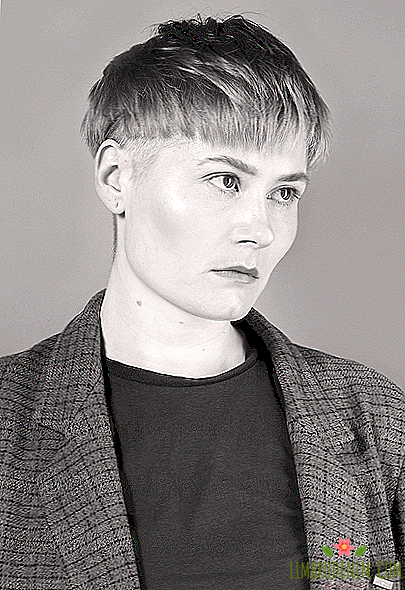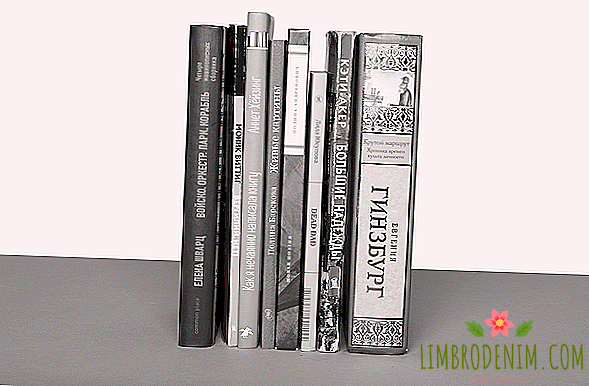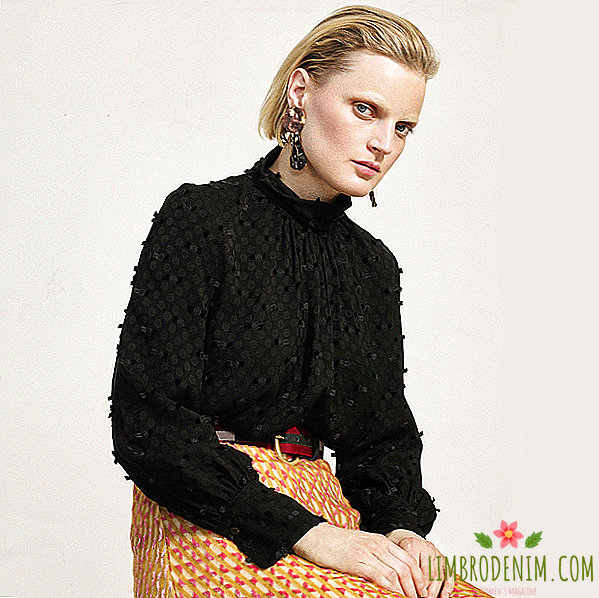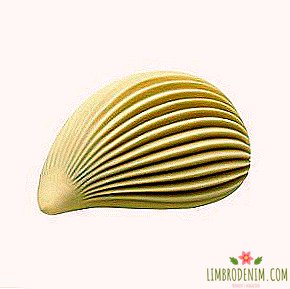Poet and feminist Oksana Vasyakina about favorite books
IN BACKGROUND "BOOK SHELF" we ask heroines about their literary preferences and editions, which occupy an important place in the bookcase. Today a poetess, a feminist, an employee of the Peresvetov Lane gallery of the exhibition halls of Moscow Oksana Vasyakina tells about favorite books.
INTERVIEW: Alice Taiga
PHOTO: Katya Starostina
MAKEUP: Anastasia Pryadkova

Oksana Vasyakina
poetess and feminist
High voltage in the text and long reading can “poison” me, and I will feel like a hangover for a few more days.
 I learned to read at four. I had a book with the text of a French song about a donkey "Our poor donkey is ill. His legs hurt him. The hostess made paper boots for him." I remember pictures of her - they caused me to have a tenderness for a caring hostess, and pity for a donkey, because he was so funny and vulnerable in his clothes. I remember how my mother made me read a book about Cipollino, and then about Buratino. Neither one nor the other I liked - they were about boys, - and I tricked, flipping through the pages as if I had read them.
I learned to read at four. I had a book with the text of a French song about a donkey "Our poor donkey is ill. His legs hurt him. The hostess made paper boots for him." I remember pictures of her - they caused me to have a tenderness for a caring hostess, and pity for a donkey, because he was so funny and vulnerable in his clothes. I remember how my mother made me read a book about Cipollino, and then about Buratino. Neither one nor the other I liked - they were about boys, - and I tricked, flipping through the pages as if I had read them.
I still do not know how to read quickly, sometimes it takes two to three weeks for one book. Perhaps this is due to my attitude to the text: I drink books, and then I get sick for a long time, I live them inside of me. High voltage in the text and long reading can "poison" me, and I will feel like a hangover for a few more days.
I remember how I found the Soviet edition of Domostroi at my grandmother. I was about seven years old, I looked at pictures, read the covenants and wondered why women should do so unbearably boring housework while men command and live an interesting life. What women are worse than men, since he is prepared for such a hell? It seems to me that it was then that I first had questions for patriarchy.
When we started to go through Russian classical literature at school, I was bored by it - I did not understand how I could embed myself in the “Hero of Our Time” or “The Captain's Daughter.” I did not understand why everyone wants to be Pechorin: I was hurt for Circassian women and it hurt because she, a human being, had lost her life because of the whims of some arrogant scum. The harshness with which Pechorin treated Princess Mary was angered me. I liked the rebel Pugachev, but I did not understand how I could become one — ride a horse, remember my duty and not be afraid of a blizzard when it is not available to women.
I grew up in a small town, and we had only one bookstore - it mainly sold teaching materials for schoolchildren, bureaucrats and erotic novels. But there was also a small regiment on which the books of the publishing house "Amfora" stood - Haruka Murakami's strange apathetic novels and the cruel ones Ryu Murakami. I had no money for them, but then they seemed to me the most cool and modern. But the money was from my friend Vera: she bought all the new items, and I took to read. I dreamed that someday I would have the means, I would come to this book and buy all the publications of all of Murakami and not only. Then, of course, I realized that both Murakami were not so cool, and I learned that not all the shops are crammed with paper and erotic paperback novels. Now I go to the Phalanster and buy the books myself.
For me, the book has always been important as an object. When I was a child, I ordered to wipe dust off the volumes that stood in the closet-wall without instructions from adults: when I looked at them, touched and flipped through them, I felt that something very important was happening to me. This feeling, which I experienced from intimacy with a book, has not gone away with the years, on the contrary, it has become cleaner and more. I always enjoy new editions, sort out them when I'm sad. For two years I worked as the manager of the “Order of Words” store and admired how many people the book can gather around itself. I love former colleagues very much and remember them with tenderness. Now the book for me is not only an intimate object, but also what builds networks of human communication.
I really like the experiment that the two women had in the library: they turned all the books that the men had written into the roots, and it turned out that there were fewer works written by women. It is important for me to read and promote books written by women, because women's faces and voices are few.
It is important for me to read and promote books written by women, because women's faces and voices are few

Polina Andrukovich
"Instead of this world"
This book today is the most complete works of the poetess Andrukovich. For me, her texts are complex, slow hieroglyphs: they do not require a solution, but they need to be read intently, and in this a completely amazing world is revealed.
I met these texts a couple of years ago, but they shock me every time I address them. The silence in which Andrukovich’s texts are immersed is stunning - but besides her there is an amazing speech, showing me, the reader, her fragility and entrusting me with her vulnerable body.
Polina Barskova
"Living Pictures"
“Live Pictures” is a tiny (one hundred and seventy pages in all) novel by the poetess and researcher of the story and the blockade letter Polina Barskova. Several times I have come across the opinion that this is not a novel, but a collection of stories or something like that. What is true is true: it consists of scattered texts, in which we speak about the forties, or what can be called the internal time of the main character. As you read, you get the feeling that a lot of people are talking to the readers, and the last chapter is not a chapter at all, but a whole play in which the hungry Hermitage staff die among empty frames.
And yet for me it is a novel. Novel-attempt, in which there is a difficult work with injury. In The Living Pictures, the historical trauma of the blockade becomes the personal trauma of the lyrical heroine. And here the phrase "lyrical heroine" is not a bow to the school curriculum and classical literary criticism, but its actualization, I would even say, rebirth. Barskova writes about the blockade as a personal pain. And this rapprochement makes her heroes alive, gives them a voice, and sometimes, it seems, even a body.
Katie Acker
"Great expectations"
Katie Acker is a very important figure for me. When I first read her book — it seemed to be Eurydice in the Underworld, I had the feeling of meeting myself. A torn, very painful, on the verge of a scream, the letter struck me with its boldness, I asked myself then: what, and so it was possible?
For all its negligence, "Great Expectations" is a complex text. Aker in him plays a great "male" literature and, playing, destroys it, literally breaks. She juggles with a masculine language and inadvertently drops it, and he breaks on the stone floor like fragile glass balls. The juggler continues, standing knee-deep in broken glass, and shouts out affective criticism of patriarchy, militarism and capitalism.
Evgenia Ginzburg
"Steep route"
I have always been interested in women's camps and what strategies women choose to survive in detention. Unfortunately, there are not so many books in Russian devoted to this topic. But we have a huge body of memoirs and diaries of prisoners of the Gulag, and the book of Eugene Ginsburg is the most famous of the monuments of that time.
It seems to me that by writing, Ginsburg itself gives a recipe for survival in conditions that destroy all living things. She writes a story of miracles, a fairy tale about the terrible journey to the Gulag and the return from hell. Only in the case of Ginzburg, she is not accompanied by Virgil, but by Pushkin, Tolstoy, Blok, through the texts of which she looks at situations like through magic glass, and, transforming a bare life, makes it tolerable.
Lida Yusupova
"Dead Dad"
If they ask me who my favorite poetess is, I will answer: Lida Yusupova. Lida is a poet who is very unusual for modern Russian poetry, possibly because she lives in Belize and meets Russian on the Internet. Lida has a hobby - she investigates criminal articles on Russian Internet resources and, starting in 2015, she writes a cycle of poetic texts "Sentences", she occupies a central place in the book about her dead father. Yusupova takes texts of verdicts on murder and rape cases from legal sites and writes new texts from them, structuring selected phrases according to the principle of a musical work. This is how terrible poems about violence are written, written in the language of the official document.
Monique Wittig
"Virgil, no!"
This is Monique Wittig, the latest novel by theorist and radical political feminism and political lesbianism. The first comrade gave me the book in the first year, I did not take it seriously, and when I became a feminist, I reread it. This is a brilliant text about the main character's journey through all circles of the patriarchal hell, accompanied by the companion’s armed rifle, Manastabal.
The book is arranged as a Boschian canvas: each chapter in it is a miniature highlighting a particular aspect of patriarchy. I like the fact that you can wander and read each chapter separately in this text. My favorite is the one where the main character reads a sermon to women in the laundry. She preaches lesbianism and gradually turns either into a harpy, or into a jellyfish, in general, into a scary creature, which many people of lesbians and feminists think.
Svetlana Adonyeva, LauraOlson
"Tradition, transgression, compromise. Worlds of Russian Country Women "
Svetlana Adonyeva is a unique scientist: she has been on folklore expeditions for thirty years, but her interpretation of oral folk art is radically different from the Soviet colonial tradition of working with texts. Adonieva views texts as part of a communicative situation and tries to understand exactly what the community involved in the ritual is going through.
The book, which Adoneva wrote together with the American researcher Laura Olson, is devoted to three generations of women. They explore the institution of the female majority and show how sociopolitical processes, such as revolution and war, have changed the daily life of a peasant woman. I think this book is about how we turned out to be children of a post-Soviet family, and she answers many questions about the gender order in which we live.
Elena Schwartz
"Army. Orchestra. Park. Ship. Four typewritten collections
There is a problem with the texts of Elena Schwartz: the complete collection of her works has not yet been published, and everything that has been published cannot be found in the books. This year, in the last book, four typewritten collections were published in one book, released in the seventies and eighties by samizdat, and I am glad of this.
I adore Elena Schwartz, this is an amazing poetess. I have enough of one of her poems to find myself in another reality. Space Schwartz is a tremendous tremendous body, everything in it is alive - not in the sense of animate, but in the sense of meat. These are visionary poems, sometimes quite terrible, but I am amazed at their impeccable sincerity.
Dorit Linke
"On the other side of the blue border"
A few years ago, everyone started talking about cool teenage literature, which appeared in Russia thanks to the publishing houses "Scooter" and "White Crow". I didn’t really believe it: my experience of reading books from the Black Kitten series fought off all the desire to read books for teenagers. But once I wanted to make a post on the social network of books, and I came across the arm on the other side of the blue border. I sat on the sofa, opened the book and closed it only when it ended. "On the other side" turned my attitude towards teenage literature.
This is a great novel about two teenagers, a sister and a brother who live in the GDR. They do not like their life - they know that there is another world behind the wall, about which it is even forbidden to think. They are being bullied by their peers and teachers because they do not want to go in line, they don’t want to think as many thinks, and most importantly because they are not afraid to say what they think. One day they decide to run for the wall, but they know how these stories end, so they prepare a thorough escape plan, train for a long time, and put on wetsuits one night and swim towards freedom.
Annette Huizing
"How I accidentally wrote a book"
This is a very little book about a teenage girl Katinka, who lost her mother when she was three years old. She goes to the neighbor-writer Lidwin to learn writing skills. She gives the girl a job, and Katinka writes how she misses her mother and loves her brother, how relationships with new lovers of her father develop, but most importantly, Katinka writes a real book about how she writes. This is such a metatext for teens. The book has a lot of useful tips from an experienced novelist Lidwin for those who want to write their own novel, but there is also a whole chapter devoted to visiting the crematorium.




